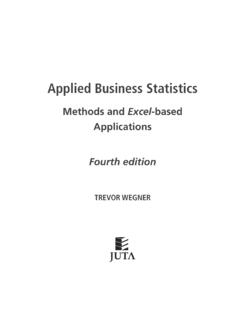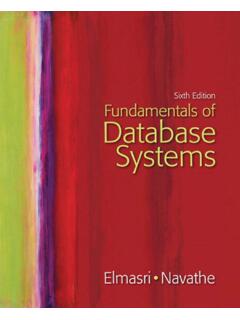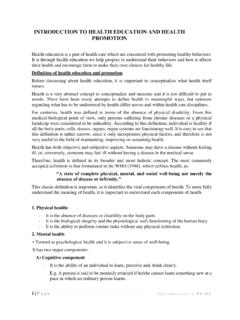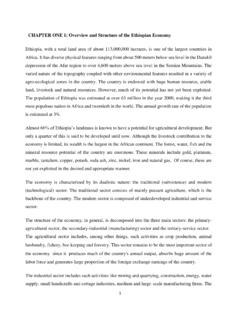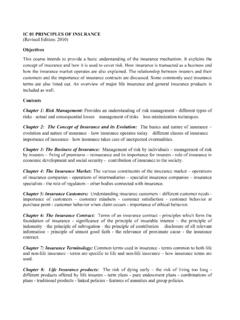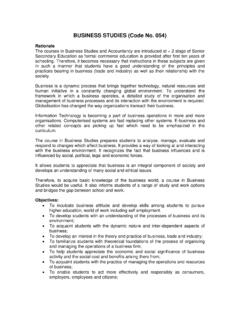Transcription of CHAPTER EIGHT INSURANCE BUSINESS IN ETHIOPIA
1 Prepared by: Biniam G. @Bonga University, Department of Management 1 CHAPTER EIGHT INSURANCE BUSINESS IN ETHIOPIA At the end of /after studying this CHAPTER , students should be able to: Discuss the historical development of INSURANCE industry in ETHIOPIA Explain the general theoretical supervision and regulation of insurances companies. Identify and explain the Licensing and Supervision of INSURANCE BUSINESS and Functions of the National Bank of ETHIOPIA in the country. Introduction In our earlier studies of the preceding chapters, we have learnt about the nature and characteristics of INSURANCE , its principles and limitations and the major types of INSURANCE . In this CHAPTER , you will primarily deal with INSURANCE policies in ETHIOPIA . A short discussion on the historical development of INSURANCE BUSINESS is made in the first section. And the second section focuses on the theoretical aspects of regulation and supervision in general.
2 A much greater emphasis has been placed on section three to the licensing and supervision of INSURANCE BUSINESS in ETHIOPIA . Historical Development of INSURANCE Traditional protection of risks in ETHIOPIA can be found in the form of Edir and Equib were people get in some financial contribution to save themselves and losses of properties from unexpected troubles in the future. According to some researches year 1951, marked the beginning of a new CHAPTER in the history of INSURANCE industry in ETHIOPIA in that it witnessed the launching for the first time entirely owned by Ethiopians called Imperial INSURANCE Company formed by the initiatives taken by some enlighten Ethiopians and the expatriates, which brought significant development in financial sector of the economy lead to the coming in to existence some eighteen company in 1954 operating in different parts of ETHIOPIA engage in offering coverage for life, marine, motor and fire or property INSURANCE services.
3 Proclamation No. 281/70 which was the first Governmental act on the supervision of INSURANCE BUSINESS in the country brought about a significant change, in that the government put the Prepared by: Biniam G. @Bonga University, Department of Management 2 governmental control in place for it feel the promotion and protection of the public Interest was timely as the scope of INSURANCE BUSINESS in the country expanded and INSURANCE registration license was setup under the Minster of trade and Industry tourism. INSURANCE BUSINESS in its modern sense in ETHIOPIA started in 1905 when the then Bank of Abyssinia got underwriting authority in the form of Agency for Fire and Marine INSURANCE BUSINESS . The first local INSURANCE company was formed in 1951. Later on the number of INSURANCE companies reached 15 of which two withdrew from BUSINESS in 1972. As a result of nationalization of these companies in 1975, Proclamation No.
4 68/1975 was declared to form the Ethiopian INSURANCE Corporation with a capital of Birr 11 million. Since nationalization, its premium production on the average has continuously grown at the rate of in 1976 to Birr 300 million in 1994/95. While its claims increased from 20 million in 1976 to Birr 160 million in 1991/92. With the declaration of Proclamation No. 86/94, which allowed the licensing and supervision of INSURANCE companies, there emerged seven more than private INSURANCE companies with a total capital of nearly Birr 205 million. The total market that was Birr 50 million in 1976 reached Birr 345 million in two decades time. These INSURANCE companies have reinsurance arrangements with reputable international re-insurers mainly from Munich Re., Swiss Re., etc. Though there is a growing performance in the industry over the last few years, the industry is facing some problems. The major problems of the existing INSURANCE companies in ETHIOPIA today are listed below in the order of importance: I.
5 Lack of adequate public awareness II. Shortage of skilled manpower III. Price cutting IV. Lack of professional ethics V. Unfavorable policies VI. Lack of proper data to conduct BUSINESS analysis Prepared by: Biniam G. @Bonga University, Department of Management 3 Licensing and Supervision of INSURANCE BUSINESS in ETHIOPIA The government of ETHIOPIA has adopted a new economic policy to guide the country s economic development direction. Under the new economic policy, the involvement and active participation of all economic sectors in the economy is called for. To this end, there arisen a need for a new and comprehensive law that governs the licensing and supervision of INSURANCE BUSINESS to enable the full participation of all sectors in the economy. It is to this effect that the licensing and supervision provision was stipulated. Dear student, in the forthcoming sections, we will discuss about some of the points related with the licensing and supervision proclamation, viz.
6 , Proclamation No. 86/94. Functions of the National Bank of ETHIOPIA The licensing and supervision proclamation attempts to figure out some of the functions expected to be played by the National Bank of ETHIOPIA in connection with INSURANCE businesses to be licensed to operate in ETHIOPIA . The principal function of the National Bank of ETHIOPIA with regards to INSURANCE BUSINESS is to formulate policy. I. Conditions for insurers The proclamation also discusses some more points in connection with the conditions that need to be fulfilled to operate in the INSURANCE industry of the country. Accordingly, in order to carry on INSURANCE BUSINESS in ETHIOPIA , any person is expected to meet the following conditions. a. It has to be a company. INSURANCE businesses need to have their separate legal personality as a separate entity, distinct from its owners. As such they will have an artificial (judiciary) personality created by law and carrying limited liability.
7 B. As stipulated in the commercial code of ETHIOPIA , the minimum capital required for a share company is Ethiopian Birr 50,000. However, proclamation no. 86/94 demands a much bigger figure for minimum share capital. The capital requirement also varies with the types of INSURANCE being carried on. Thus, the INSURANCE share capital should not be less than I. Birr 3,000,000 if the BUSINESS is a general INSURANCE BUSINESS II. Birr 4,000,000 if the BUSINESS is a long-term INSURANCE BUSINESS Prepared by: Biniam G. @Bonga University, Department of Management 4 III. Birr 7,000,000 if the BUSINESS is a both general and long-term INSURANCE BUSINESS . c. The insurer is required to deposit cash in its own name to the amount of the capital stated above. Deposit requirements, as will be discussed in the subsequent pages, will also be extended to statutory reserves, as a percentage of paid up capital and legal reserves, a percentage of annual profits of insurer.
8 D. The INSURANCE company, after fulfilling the requirements set by Proclamation No. 86/94 and the National Bank of ETHIOPIA , need to obtain a license for operation. e. It needs to have principal officers that meet the standard set by the National Bank. II. Shares The Proclamation also discusses about the features of the shares to be issued by the INSURANCE companies. In this regard, it dictated INSURANCE companies to issue only one class and registered ordinary shares of the sum per value. In addition, the proclamation prevents owning of more than twenty percent (20%) of the company s share by any one person or with persons related with him to first degree. III. Licensing of Insurers Persons should get the license for the particular class or classes of INSURANCE BUSINESS they would like to operate. In addition, the proclamation stipulates that every application for the grant of a license should be accompanied by memorandum and articles of association, INSURANCE policy forma and such other particulars as may be prescribed by directive to be issued by the National Bank.
9 A license granted by the National Bank shall constitute final authorization to carry on INSURANCE BUSINESS in ETHIOPIA . IV. Cancellation of licenses The National Bank may cancel the license of an insurer either wholly or in so far as it relates to a particular class of INSURANCE BUSINESS : - a. If the provisions stated in the proclamation are not being complied with by the insurer. b. If the margin of solvency of the insurer fails below the line provided. c. If the insurer, at any time during the period of validity of the license injects his funds, moneys or assets or any part thereof in investments prohibited by law. d. If the BUSINESS or a class of BUSINESS of the insurer has been transferred to or amalgamated with any other insurer. Prepared by: Biniam G. @Bonga University, Department of Management 5 e. If the insurer carries on BUSINESS other than INSURANCE BUSINESS without the authorization of the National Bank or any class of INSURANCE other than the one for which he is licensed.
10 F. If the insurer has not conducted any INSURANCE BUSINESS for twelve months after the grant of license. g. If the insurer has failed to comply with the requirements of the NBE. V. Statutory Deposits The proclamation stipulated articles with regard to the amount of deposits to be made by the INSURANCE companies as well. According to it, every insurer shall, in respect of each main class of INSURANCE BUSINESS he carries in ETHIOPIA , deposits and keeps with the National Bank an amount equal to fifteen percent (15%) of his paid up capital, in government securities The deposit specified above shall be held to the credit of the insurer provided that the aforesaid deposit or any part there of shall not be withdrawn except with a written permission of the NBE, nor shall such deposit be used as a pledge or security against any loan or overdraft. VI. Legal reserve According to this same proclamation, every insurer shall credit for ten percent (10%) of his annual profit into its legal reserve account.



